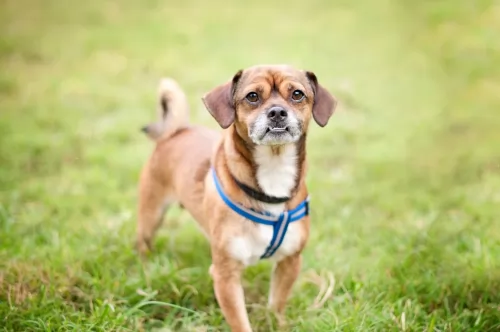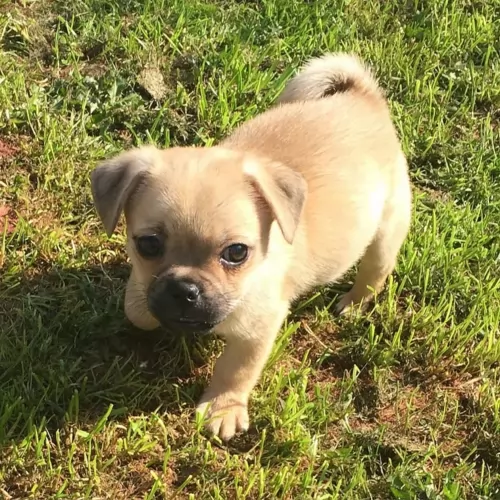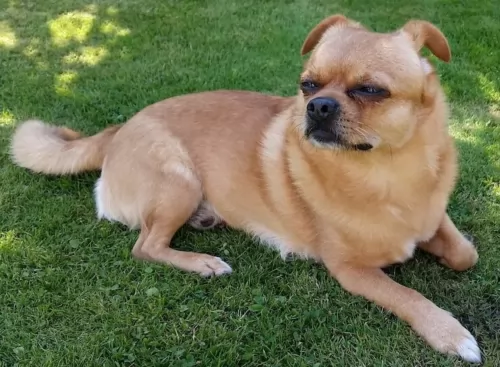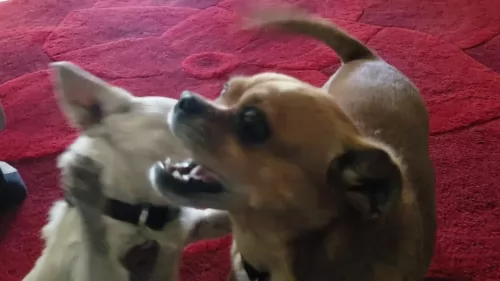 Petzlover
Petzlover Chug is originated from United States but Schipperke is originated from Belgium. Chug may grow 8 cm / 3 inches shorter than Schipperke. Both Chug and Schipperke are of same weight. Both Chug and Schipperke has almost same life span. Both Chug and Schipperke has almost same litter size. Chug requires Moderate Maintenance. But Schipperke requires Low Maintenance
Chug is originated from United States but Schipperke is originated from Belgium. Chug may grow 8 cm / 3 inches shorter than Schipperke. Both Chug and Schipperke are of same weight. Both Chug and Schipperke has almost same life span. Both Chug and Schipperke has almost same litter size. Chug requires Moderate Maintenance. But Schipperke requires Low Maintenance
 The Chug is a crossbreed with the Pug and the Chihuahua. It is a hybrid not a purebred. Over the past ten to fifteen years people have been developing the Chug, mostly in the United States. People were looking for a lapdog with the characteristics of both the Chihuahua and the Pug. The hybrid dog has characteristics of both breeds, both physical and behavioral. Of course, the Chug is not recognized by the AKC, but it is recognized by hybrid and designer dog clubs such as The American Canine Hybrid Club, Designer Breed Kennel and the International Designer Canine Registry.
The Chug is a crossbreed with the Pug and the Chihuahua. It is a hybrid not a purebred. Over the past ten to fifteen years people have been developing the Chug, mostly in the United States. People were looking for a lapdog with the characteristics of both the Chihuahua and the Pug. The hybrid dog has characteristics of both breeds, both physical and behavioral. Of course, the Chug is not recognized by the AKC, but it is recognized by hybrid and designer dog clubs such as The American Canine Hybrid Club, Designer Breed Kennel and the International Designer Canine Registry.
 The Schipperke is a small dog which hails from Belguim and where he is known as a Spitz.
The Schipperke is a small dog which hails from Belguim and where he is known as a Spitz.
There are however different theories regarding the Schipperke’s origin. It was however during the late 1800s, that Belgian Schipperke fanciers set a standard for the breed.
It was in 1888 that the first Schipperke was imported to the United States and a specialty club for the breed founded in 1905.
 The Chug can vary greatly in looks and build from one dog to another. For the most part however, Chugs are small compact dogs, sturdy and muscular. They have a very expressive and lovable face with folding ears, almond shape eyes and short muzzles. Their faces are similar in looks to that of a miniature boxer. .
The Chug can vary greatly in looks and build from one dog to another. For the most part however, Chugs are small compact dogs, sturdy and muscular. They have a very expressive and lovable face with folding ears, almond shape eyes and short muzzles. Their faces are similar in looks to that of a miniature boxer. .
 This little Belgian dog stands at between 25 and 33cm in height and weighs between 3 and 9kg.
This little Belgian dog stands at between 25 and 33cm in height and weighs between 3 and 9kg.
The double coat of the dog is fairly short, but thick and it comes in a range of colors, but always solid, from chocolate to apricot to black.
A typical characteristic of his is the longer-haired ruff around his neck. He also has this longer hair around the hind legs. He has sharp, erect ears and the tail is a natural bobtail or long. Most people choose to have the tail docked.
These little dogs are no pushover. He is stubborn, strong-willed and confident. They are lively, intelligent, curious and energetic and will require plenty of exercise.
Small though he is, he will certainly need training and socialization, otherwise he just goes his own way. Training him will ensure he is obedient and not so strong-willed. They get on well with children, but they tend to be aggressive with other dogs that they haven’t grown up with.
Bring him up the right way and he makes a splendid pet.
 Because they are a hybrid, chugs can have a very wide range of different characteristics depending upon whether they have more from the Pug or more from the Chihuahua. But either way they are very lovable little dogs with big personalities. Regardless of whether your dog favors the clown Pug or the stately Chihuahua, your puppy will be a lovable ball of fur. He will be affectionate, friendly and aggressive to bigger dogs.
Because they are a hybrid, chugs can have a very wide range of different characteristics depending upon whether they have more from the Pug or more from the Chihuahua. But either way they are very lovable little dogs with big personalities. Regardless of whether your dog favors the clown Pug or the stately Chihuahua, your puppy will be a lovable ball of fur. He will be affectionate, friendly and aggressive to bigger dogs.
 With his bright little face, the Schipperke dog is a surprising dog, being fearless, confident, protective and devoted – everything people looking for in an excellent pet want.
With his bright little face, the Schipperke dog is a surprising dog, being fearless, confident, protective and devoted – everything people looking for in an excellent pet want.
His small size makes him able to slot into life in the city or the countryside. He is also looked upon as low maintenance. Add to this the fact that he is intelligent too. He is a feisty dog, and that’s why we say he is surprising because while he can be your sweet companion dog, he can turn into a robust, feisty, daring little panther. He’s got everything going for him to make you a splendid pet.
 The Schipperke has no real health problems that he specifically gets, and he can live to be 13 years or older.
The Schipperke has no real health problems that he specifically gets, and he can live to be 13 years or older.
Over-feeding, bad food choices and lack of exercise are going to shorten the lifespan of this dog. Some dog illnesses to be aware of with the Schipperke is cancer, bloat, epilepsy, dental problems and luxating patella.
This is a condition where the knee cap of the dog moves out of its natural position. The patella moving out of the normal groove of the thigh bone can be because of genetic or traumatic reasons.
The symptoms of luxating patella include limping, skipping along as well as an abnormal sitting posture. Arthritis can also set in. Strangely, many small dogs live all their lives with luxating patella and they live like that free of pain. However for many other dogs it can mean pain and it can require surgery.
 Pugs have great appetites and love to eat and Chihuahuas wont turn down a meal so be careful not to overfeed your Chug. It is important to feed a small breed formula whether you use dry or wet food.
Pugs have great appetites and love to eat and Chihuahuas wont turn down a meal so be careful not to overfeed your Chug. It is important to feed a small breed formula whether you use dry or wet food.
Some additional issues that Chugs deal with in respect to health include:
Both elbow and knee inflammations can lead to arthritis and lameness
Chugs can have runny eyes or cherry eye. If they have cherry eye you will want to treat it immediately or there could be secondary issues with inflammation and infection.
Chugs may be little, but they still need a moderate amount of exercise every day. A regular walk will do or indoor or outdoor playtime every day. They like obedience, rally and some can do small dog agility, but they would have to be on the larger size for Chugs. Chugs also make great therapy dogs.
 Dry kibble is always a good choice for dogs as its helps to keep the dog’s teeth clean. You want to make sure you buy one of the best quality foods, full of minerals and vitamins as opposed to fillers, colorants and preservatives. The food you give your Schipperke can have a huge impact on his health.
Dry kibble is always a good choice for dogs as its helps to keep the dog’s teeth clean. You want to make sure you buy one of the best quality foods, full of minerals and vitamins as opposed to fillers, colorants and preservatives. The food you give your Schipperke can have a huge impact on his health.
Your puppy will require 4 meals a day but later this becomes 2 bowls of food. To add some variety to your pet’s diet, feed him some home made food occasionally which can be added to his dry kibble twice a week.
Boiled chicken, brown rice or pasta and spinach, sweet potatoes and carrots are a healthy choice for your Schipperke.
Try and include some raw meat into the diet as this can help in fighting off horrible skin diseases. Make sure he has constant access to fresh, cool water.
Ensure regular vet checks for your dog, particularly when he is showing signs of being sick.
Check your pet for ticks and fleas. Parasites can be very bad for your pet’s health. Your dog will need all his vaccines to stave off deadly canine illnesses.
Brush your Schipperke twice a week to make sure you get rid of loose hairs. A Schipperke doesn’t shed a lot.
Keep his nails trimmed. If you are unsure on how to do this, professional groomers can do this for you.
Ears and eyes should also be checked.
He’s an energetic little dog so make sure that he gets lot of excellent forms of exercise from walking to hikes to ball games, frisbee – you name it, you won’t tire him out easily.